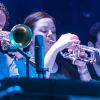Home » Jazz Articles » Album Review » Andrew Rathbun Large Ensemble: Atwood Suites
Andrew Rathbun Large Ensemble: Atwood Suites
Celebrated Canadian author Margaret Atwood is primarily recognized as a novelist, having penned The Handmaid's Tale (McClelland and Stewart, 1985), The Blind Assassin (McClelland and Stewart, 2000), and numerous other award-winning books. But she also has more that fifteen volumes of potent poetry under her writer's belt. Rathbun, a saxophonist-composer with a thoughtful musical pen and lyrical bent, was immediately taken by her poems. His True Stories (Fresh Sound New Talent, 2000) takes its title from one of them, which is set to music there, and this grand-scale large ensemble work furthers his relationship with Atwood's verse(s).
The first CD in this two-disc set presents Two Islands and Power Politics—a pair of three-movement suites rendered by an eighteen piece ensemble plus featured guests Luciana Souza, giving voice to Atwood's writing and wordless lines, and Tim Hagans, flying with his flugelhorn. The first movement of Two Islands, opening the album, offers a seamless yet segmented evolution. A prelude for winds leads to Souza, whose riveting work is artfully supported by pianist Jeremy Siskind. Then Hagans has his day with the band, Souza's wordless windings add luster to the shifting textures, Nate Radley offers atmospheric-turned-searing guitar work in a rock zone, and things come full circle with Souza's lyric-driven return. The second movement, with Hagans in the starring role, starts in cooler territory but progressively heats up. It's far more streamlined in its development than its predecessor. Then drummer Bill Stewart kicks off the final movement with his inimitable soloing. Souza enters atop a springy waltz feel, Hagans runs strong and fat-toned over the band, a brief transition (sans rhythm section) focuses on horns and wordless vocals, and tenor saxophonist Quinsin Nachoff enters the fray and points the way back to Souza.
The Power Politics suite, with each movement taking direction from a poem from Atwood's "We Are Hard On Each Other," opens with Souza's emotionally resonant vocals. As she adds depth and shape to Atwood's words—"We are hard on each other and call it honesty, choosing our jagged truths with care and aiming them across the neutral table. The things we say are true; it is our crooked aim, our choices turn them criminal"—the universality of truth and pain in relationships is illuminated. So, too, is Rathbun's brilliant writing. The influence of Kenny Wheeler on this composer doesn't go unnoticed here and elsewhere on the album, as the heavenly blend of horns and wordless vocals flow through the air to create a current beneath and around the flugelhorn; both having come under Wheeler's wing and having had him perform the piece a number of times years ago gave Rathbun the confidence and motivation to put together his own band, so that's no real surprise.
The second movement of Power Politics—a lengthy journey with a Siskind sign-in, band buildup, Souza statement, horn happening, and solos from trombonist Mike Fahie, Hagans, and tenor saxophonist Dan Pratt—proves incredibly expansive without losing focus. It's the longest track on the album, clocking in at more than thirteen minutes. The concluding movement begins with flowing sentiments before Stewart sets things in motion. Notable solos from saxophonist John O'Gallagher, Hagans, and bassist Dave Ambrosio carry things through to Souza's last offering. It's a moving finale to an incredibly rich and powerful production.
While that first disc can easily stand on its own, this album moves beyond it. On the second disc, featuring guest vocalist Aubrey Johnson, Rathbun introduces "Fractured," a work drawing on the divisive political climate in America these days, and "I," "II," and "V," drawn from another suite that Rathbun composed during a stay at the MacDowell Colony. The standalone "Fractured" makes its point in choppy and broken notions, yet the grand unification and synchronization of these splintered thoughts seems to represent togetherness and hope bridging the gulf that separates too many. Radley, Siskind (on Rhodes), and trumpeter Russ Johnson (on flugelhorn) each deliver the goods in fitting fashion there. Then "V" invests in broad strokes of color, inviting Radley to the fore; "I" emphasizes a passage in time, playing up the woodwind doublers' other horns, finely weaving Johnson's vocals into the fabric, and giving trumpeter Matt Holman some space to shine; and "II" enters with full-bodied poignancy before moving into a hypnotic zone, opening up for Alan Ferber's trombone, and soaring back towards its trance state.
These incredibly detailed works are not the types to instantly reveal themselves in full, so better to appreciate the big picture up front and savor the smaller details through repeated listening(s). The writing works on both general and specific levels, allowing the listener to move deeper into the music as familiarity grows. By honoring Margaret Atwood's poetry and playing to his own musical visions, Rathbun has created music that's elevated by its intelligence and vibrancy.
Track Listing
Two Islands I; Two Islands II; Two Islands III; Power Politics I; Power Politics II; Power Politics III; Fractured; V; I; II.
Personnel
Andrew Rathbun
saxophone, tenorJohn O'Gallagher
saxophone, altoBen Kono
saxophoneQuinsin Nachoff
saxophoneDan Pratt
saxophoneCarl Maraghi
saxophone, baritoneTim Hagans
trumpetBill Stewart
drumsDave Ambrosio
bassNate Radley
guitarJeremy Siskind
pianoRuss Johnson
trumpetAlan Ferber
tromboneMike Fahie
tromboneSeneca Black
trumpetLuciana Souza
vocalsAubrey Johnson
vocalsJC Sanford
composer / conductorMatt Holman
trumpetDave Smith: trumpet, flugelhorn; Chris Olness: bass trombone; Owen Howard: drums (1, 2 on disc 2).
Album information
Title: Atwood Suites | Year Released: 2018 | Record Label: Origin Records
< Previous
Closing concert at 2018 Alba Jazz Fes...
Next >
Theirs
Comments
About Andrew Rathbun
Instrument: Saxophone, tenor
Related Articles | Concerts | Albums | Photos | Similar ToTags
For the Love of Jazz
 All About Jazz has been a pillar of jazz since 1995, championing it as an art form and, more importantly, supporting the musicians who create it. Our enduring commitment has made "AAJ" one of the most culturally important websites of its kind, read by hundreds of thousands of fans, musicians and industry figures every month.
All About Jazz has been a pillar of jazz since 1995, championing it as an art form and, more importantly, supporting the musicians who create it. Our enduring commitment has made "AAJ" one of the most culturally important websites of its kind, read by hundreds of thousands of fans, musicians and industry figures every month.





































